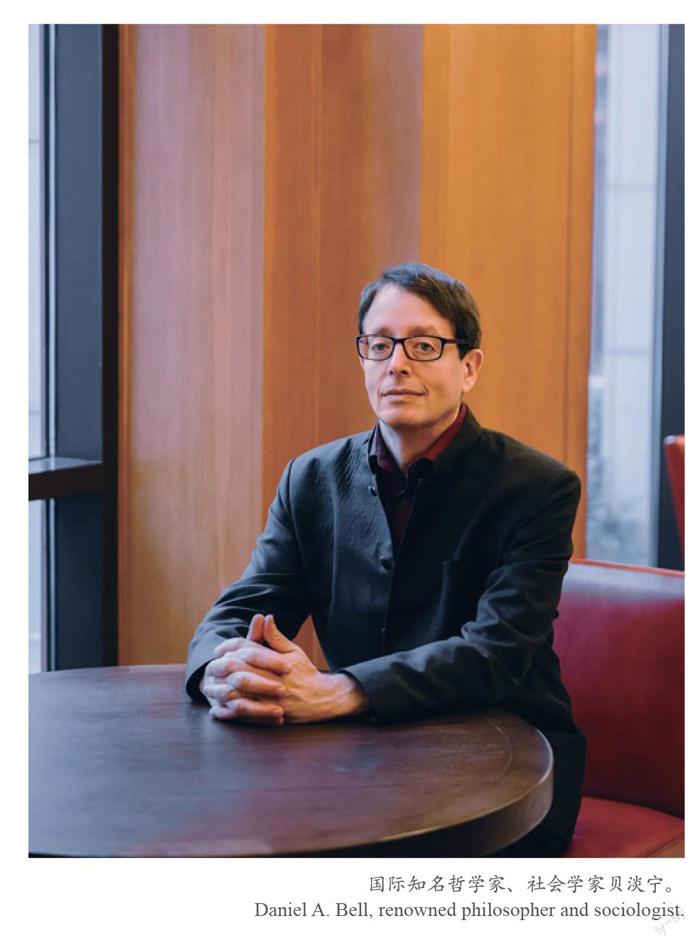和合文化 世界之需
韩兢



又是一年的丰收之季,2022年和合文化全球论坛再次来到天台,这次大会主题是“和合文化与促进共同发展”。
所谓的和,指的是和平、和谐等概念;合,指的则是合作、联合之意。倡导和合文化的中外学者认为,将“和”与“合”两个单独的字连用成为一个概念,是中国古代思想家所独创的。学者们还认为,中华文明能持续发展五千年,其中一个重要因素是中华文化的强大凝聚力、亲和力,而这些“力”都集中体现在和合文化上。和合文化,毫无疑问是中华文化的精髓之一。
和合关系:中国人情关爱具有巨大吸引力
寒山和拾得是和合文化中最独特的象征之一,他们所传达的不仅是一种对“身心和合、天人和合”的精神追求,更是对人与人之间建立互敬互爱、和谐相处的“人际和合”关系的传统倡导。中国人情往来中饱含的关爱、友善、包容,总是在细节中彰显出独特魅力,给人以最直接的美好体验,这也正是和合文化之所以具有强大吸引力的重要原因之一。
在多次采访中,经常能看见白皮肤、蓝眼睛的国际知名汉学大师、美国人安乐哲身着正装,与一群中国学者站在一起,十分显眼,他总是用流利的汉语不紧不慢地侃侃而谈,不时引用《论语》等古文经典。安乐哲同时还是北京大学哲学系教授、美国夏威夷大学哲学系名誉教授。
1966年,18歲的安乐哲从美国加州雷德兰斯大学赴中国香港学习一年。“那时候,西方人不了解中国,感觉只是‘遥远的东方,而我当时是个喜欢写诗的年轻人。”安乐哲接受采访时曾这样回忆道。出于增长见识、丰富阅历的初衷,他来到中国,于是便迷上了中华文化和中国儒学。
“我很喜欢中国人与人之间的热情关爱,以及注重家庭和谐关系的传统。”从此,安乐哲与中国结下了不解之缘,后辗转于哥伦比亚大学、台湾大学、伦敦大学、剑桥大学等一流学府求学,取得中文硕士、博士学位和中国哲学硕士、博士学位。
安乐哲的一生几乎都在“翻译中国”。《论语》《孙子兵法》《淮南子》《道德经》等中国经典书籍被他翻译后,在西方学界引起广泛关注。
同样对中国人情关怀有深刻体会的还有加拿大人贝淡宁。他有两个身份,一个最亲切的身份就是中国女婿,而另一个被学界所熟知的身份则是在中国居住20多年、常年研究儒家学说的外籍学者。他先后获得加拿大麦克吉尔大学文学学士、牛津大学哲学硕士、牛津大学哲学博士学位,先后在新加坡、美国及中国香港等国家和地区从事教学与研究工作。
作为儒家文化的研究学者,贝淡宁这几年被聘为山东大学政治学与公共管理学院院长。他觉得“很有归属感”,不仅因为山东人热情好客、性格爽朗,更因为山东是孔孟之乡,在中国优秀传统文化的传承上有着独特优势,“山大学派”在儒学研究领域更是颇具影响力。
和合思维:从“有限游戏”到“无限游戏”的桥梁
安乐哲曾引用美国哲学家詹姆斯 · 卡斯(James P. Carse)提出的一个关于人和人相处有两种模式的理论:一种被称为有限游戏,另一种则被称作无限游戏。
“有限游戏”指的是人类从事的所有活动,如商业、体育、外交、国防等,其本质就是有始有终。“有限游戏”是基于一组有限的规则来进行的,有赢家和输家。但“无限游戏”就完全不同了。“无限游戏”需要我们一起去面对这个日趋复杂、日益艰险的世界,携手合作,共同努力,这样才能实现共赢。
对此,安东哲提出,在当今世界,我们必须从“有限游戏”走向“无限游戏”,从非赢即输的模式转变为谋求共同利益的模式。
这种共同应对问题的模式从根本上来说就是和合思维的体现,而和合文化就是其中的一座桥梁。越是了解和合文化的精髓,就越是能对和合思维、对构建人类命运共同体倡议产生强烈的认同。
安乐哲说,面对全球变暖、新冠肺炎疫情大流行、食物和水资源短缺等问题,如果我们不能携手共进,就会面临共同失败的危机——这就是我们现在的处境。所以,如果我们不能凭借智慧走向“无限游戏”,那么随着问题变得越来越严重,我们也将不得不学会合作——这种必要性将会出现。
安乐哲曾很尖锐地批判一些西方学者所提出的东西方文明将不可避免地走向冲突的断言。他指出,从历史上看,从东方到西方,彼此的沟通与交流的愿望从未停止。他指出,期待新世界文化秩序的呈现,需以和合文化来增强人类共同命运体意识,从和合文化视野去理解中国与世界未来发展的趋向。
安乐哲还提到,中国文化传统是宝贵的精神财富,(西方)现在个人主义的意识形态,没有办法解决我们现在人类面对的所有问题,包括全球变暖、环境破坏等方方面面的严峻挑战,这些都需要合作,是“己欲立而立人”的问题。所以现在的世界尤其需要儒学。
和合文化与儒家文化:可以解决今日全球挑战
安乐哲任教的美国夏威夷大学,是当年国际上唯一开设中国哲学专业的外国高校。“说中国没有哲学简直是一个笑话!”他常常与一些西方人据理力争,不断讲解儒家思想、传统文化背后的“中国智慧”。
“中国的传统思想可以帮助世界解决今日的全球挑战。” 贝淡宁在接受采访时也曾如是说。他认为,西方社群主义的理论就是先有个人主义的文化,然后再用社群主义来修正一些问题;而儒家文化则是首先强调和谐的社会关系,然后再考虑以个人主义的价值观来修正一些问题。
“如果没有家庭、朋友,没有城市、国家和天下,那都是不可想象的。这是一个最基本的问题。”在贝淡宁看来,解决当今的很多问题要优先考虑社会关系,考虑如何对这些社会关系加以排序,如何解决个人选择过程中出现的矛盾;重要的是要强调人们在社会关系中所应该担当的责任,随后才可以考虑别的东西。
回溯历史,他寻找到很多中国传统文化里具有包容、合作特性的部分。他说,纵观整个中华民族的发展历史,一些能够达到相关文化标准的外来移民常常也能获得“华族”待遇。比如,唐朝时就曾雇用大量“外国人”为官,包括朝鲜人、日本人和阿拉伯族裔。
20世纪20年代初,孙中山先生也曾提出一种极具包容性和同化性的理念,即任何人都可以成为中国人,只要他接受中国文化方式。贝淡宁通过自身经历产生一种观点和信念,那便是只要认可和接受中国文化方式,总有一天都可以融入伟大的中华传统文化和中华文明,并引以为傲。
在贝淡宁看来,尽管直到今天全球受新冠肺炎疫情影響的阴霾仍挥之不去,但从整体来看,与相对富裕的众多西方国家相比,当前中国已经较好地控制住了疫情,其死亡人数和社会混乱程度均低于这些国家。此外,韩国和越南等周边国家在疫情控制方面也似乎做得很好。贝淡宁认为,儒家文化和儒家观念有助于解释中国以及亚洲一些国家和地区在抗疫防疫上为何会更加积极地采取以人为本、生命至上的举措,比如民众更愿意配合政府最大程度地遵守社会的整体规则,以及中国人、亚洲人对孝顺老人、尊重专业人士等儒家价值观的重视。而这些恰恰是儒家文化所能带给世界非常宝贵的精神财富,它足以成为解决全球众多问题的关键钥匙。
近年来,贝淡宁积极促进中国传统思想开展跨文明对话,通过学术成果将其置于全球跨文明对话的前台和中心位置。贝淡宁直言,希望通过自己的努力让更多外国人学习中国政治哲学,在中国与世界的文化交流中搭起一座桥梁。
(本栏目图片除署名外均由天台县委宣传部、天台县文化和广电旅游体育局、浙师大非洲研究院等提供)
Why Is the Hehe Culture Needed
by the World Today?
By Han Jing
It is another fruitful season and the 2022 Hehe Culture Global Forum is upon again. The second annual edition of the event, held in its permanent venue Tiantai county, Taizhou city in East Chinas Zhejiang province, focuses on how the Hehe culture can promote common development, and the Global Hehe Culture Alliance was also launched during the forum.
Of the phrase “Hehe”, the first He (和) refers to such concepts as peace and harmony, and the second he (合) refers to cooperation and integration. Scholars who advocate that culture believe the combination of the two characters into a concept is an original creation of ancient Chinese thinkers; an important factor in the sustainable development of Chinese civilization for 5,000 years is the strong cohesion and affinity of Chinese culture, the Hehe culture.
“Hanshan and Shide” is one of the unique symbols in the Hehe culture. What is conveyed is not only a spiritual pursuit of “harmony between body and mind, harmony between man and nature”, but also the traditional advocacy of mutual respect, love and harmonious coexistence between people and of “interpersonal harmony” relationships. The care, friendliness, and tolerance in Chinese human relations always show unique charm in the details, giving people the most direct good experience, which is one of the important reasons why the Hehe culture is so attractive.
In many interviews, Roger T. Ames, a renowned sinologist, has stood with a group of Chinese scholars, speaking in fluent Chinese and citing ancient classics such as The Analects of Confucius from time to time. He is a professor of philosophy at Peking University and an honorary professor at the University of Hawaii.
In 1966, 18-year-old Ames went from the University of Redlands in California to Hong Kong to study for one year. “At that time, Westerners didnt understand China, and they felt it was just a ‘far east, and I was a young man who liked to write poetry.” He came to China with the original intention of increasing his knowledge and enriching his experience, so he became fascinated with Chinese culture and Confucianism.
“I like the warm care and love among Chinese people and the tradition of harmonious family relationships.” Since then, he has forged an indissoluble bond with China, and later went to Columbia University, University of London, Cambridge University and other first-class universities. He obtained a masters degree and a doctorate degree in the Chinese language and a masters degree and a doctorate degree in Chinese philosophy. He spent his whole life “translating China”. His translation of Chinese classics such as The Analects of Confucius, Sun Tzus Art of War, Huainanzi, and Dao De Jing, has attracted widespread attention in academia.
The Canadian Daniel A. Bell also has a deep understanding of Chinas humaneness. He has two identities, one of which — the most intimate one — is a Chinese son-in-law, and the other, better-known in the academia, is a foreign scholar who has lived in China for 20-odd years studying Confucianism. He obtained a Bachelor of Arts degree from McGill University, a Master of Philosophy and a Doctor of Philosophy from Oxford University.
As a scholar, he has been teaching in Shandong University as the Dean of Political Science and Public Administration in recent years. He felt “a great sense of belonging”, not only because Shandong people are hospitable and cheerful, but also because Shandong province is the hometown of Confucius and Mencius, with unique advantages in inheriting Chinas fine traditional culture.
Professor Ames once talked of American philosopher James P. Carse, who proposed a two-way relationship with people: one is a finite game, while the other an infinite game. “Finite games” refer to all activities that humans engage in, such as business, sports, diplomacy, national defense, etc., which by nature have a beginning and an end, based on a limited set of rules, with winners and losers. But “Infinite Games” is quite different; it requires us to face this increasingly complex and dangerous world together, work together, so as to achieve a win-win situation. Ames has argued that in todays world, we must move from “limited games” to “infinite games”, and from a win-or-lose model to a win-win or lose-lose model. This mode of coping with problems is fundamentally the embodiment of Hehe thinking, and the Hehe culture is one of the bridges. The more you understand the essence of the Hehe culture, the more strongly you can identify with Hehe thinking and the Chinese-style initiative to promote common development by building a community with a shared future for mankind.
In the face of global warming, food and water shortages, if we dont work together, we will face a crisis of common failure — and thats where we are now. So, if we cant move toward the “infinite game” wisely, then as the problem becomes more and more serious, we will have to learn to cooperate — a necessity that will arise.
Ames has sharply criticized the assertion of some Western scholars that Eastern and Western civilizations will inevitably lead to conflict. He points out that historically, from the East to the West, the desire to communicate and exchange with each other has never stopped, that in anticipation of the emergence of a new world cultural order, it is necessary to enhance the sense of common destiny of mankind with the Hehe culture, and to understand the future trend of China and the world from the perspective of the Hehe culture.
He also mentioned that Chinese cultural tradition is precious, and the current (Western) ideology of individualism is no way able to solve all the challenges we are facing today, including global warming and environmental damage, all of which require cooperation.
The University of Hawaii, where Ames taught, was the only international school that offered a major in Chinese philosophy. “Its a joke to say that there is no philosophy in China!” He often argues with Westerners, and he constantly explains the “Chinese wisdom” behind Confucianism and traditional culture.
“Chinas traditional thinking can help the world solve global challenges,” Professor Bell also said in an interview. He believes that the Western theory of communitarianism is to have an individualistic culture before communitarianism comes in to correct some problems, while the Confucian culture emphasizes harmonious social relations, before considering individualistic values to fix issues.
“In my opinion, it is unimaginable if there is no family, friends, city, country and the world. This is a basic problem.” In Bells view, social relations should be prioritized in solving many of todays problems, considering how to rank these social relations, and how to resolve the contradictions that arise in the process of personal choice; it is important to emphasize the responsibilities that people should take in social relations before other things can be considered.
Looking back on history, he found many parts of traditional Chinese culture that are inclusive and cooperative. He said that throughout the history of the Chinese nation, some immigrants who can meet the relevant cultural standards often receive “Chinese” treatment. For example, the Tang (618-907) court employed many “foreigners” as officials, including Koreans, Japanese and Arabs.
In the early 1920s, Dr. Sun Yat-sen also put forward a very inclusive and assimilating idea that anyone can become a Chinese as long as he accepts the Chinese cultural way. Through his own experience, Prof Bell developed a belief that one day as long as you recognize and accept the ways of Chinese culture, you will be able to integrate into the great traditions of the Chinese civilization, and be proud of it.

